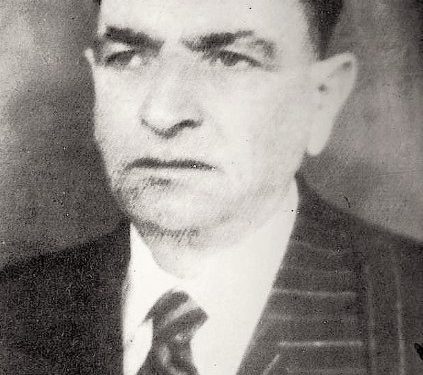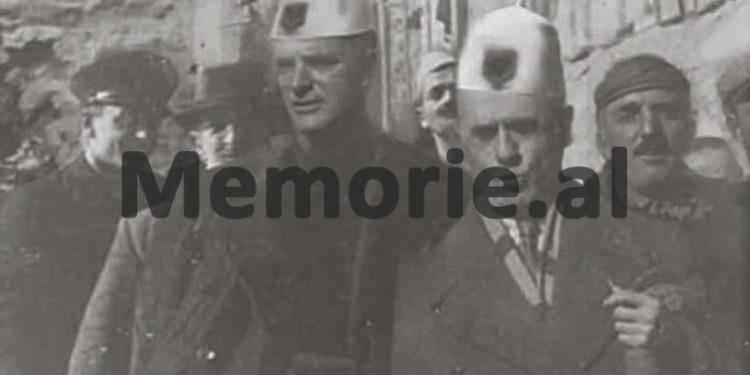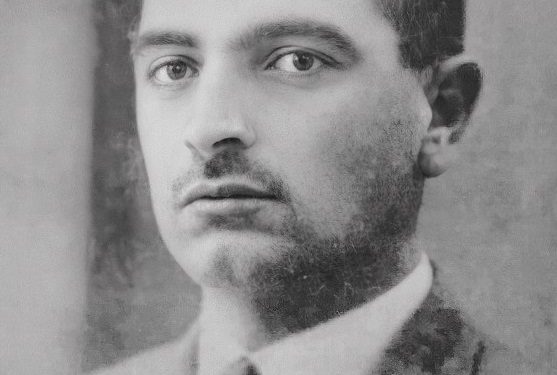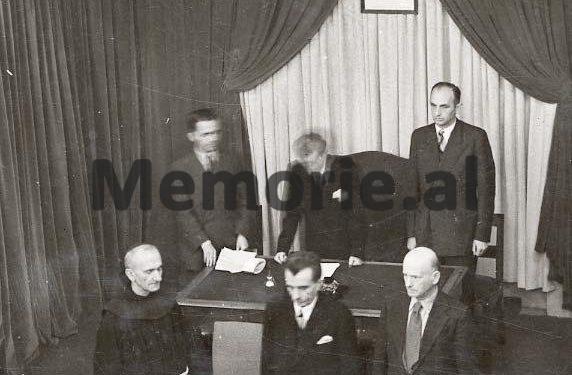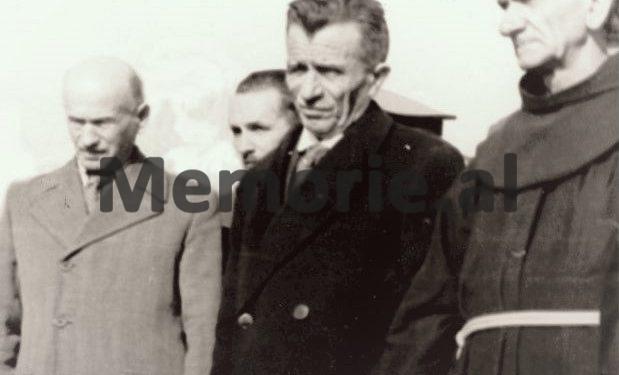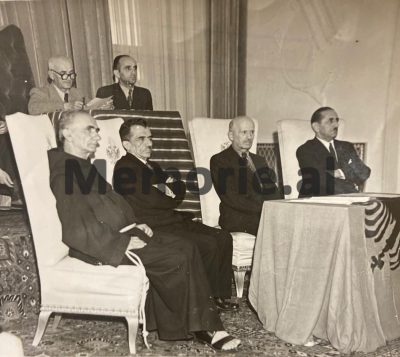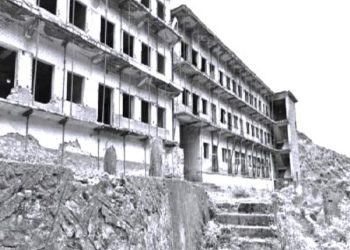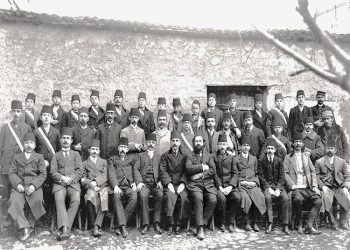By Eugen SHEHU
Memorie.al / Like a magnificent river that is about to flow into the sea, so the history of the territory of Dibra, seeks to wake up through time. This awakening, although painful, although with surprising truths, is always welcomed by Albanians, wherever they live. This awakening calls out not only history, but also brings to our memory today the names of prominent sons of Dibra, Fiqri Dine deserves to be remembered forever with respect. Born in March 1898, Fiqiriu would be one of the many sons of this well-known family in all of Maqellara. Dine Maqellara, the close friend of Elez Isufi, Sufë Xhelili, Sadulla Strazimir and Nazif Grazhdani, stood out especially in the great Albanian national movement, for the declaration of independence.
A series of battles in the years 1910-1911 proved not only Dina Maqellara’s bravery, but also his centuries-old hatred towards Serbo-Slavs. I think it is appropriate to remember that the Albanian governments after 1915, several times sought out Dine Maqellara in Durrës and Tirana, making proposals for specific positions and functions, but the wise and brave man was satisfied with the provincial task of the mayor of the municipality of Maqellara, a position he held until the day he died.
The eldest of his sons, Fiqiriu, finished high school in 1914, in Dibër te Madhe, where he stood out among his friends for his high results in lessons. It is for this reason that Dine Maqellara interferes with some of his friends in Austria and Fiqiriu, now 17 years old, takes the road to the military academy in Austria. Here, the ingenuity and outstanding military talent of Fiqiri stand out, who, although he achieved high results in lessons, had his mind on the Balkan turmoil of the years 1915-1918 and, especially on his dear Dibra. After finishing the military academy, in 1919, Fiqiri Dine returned to his homeland.
At first, he served for several months as a soldier with the rank of second lieutenant, in Shkodër, and even, with the formation of the national government from the Assembly of Lushnja, Fiqiriu was included in the ranks of the gendarmerie of the Albanian National Army, with the rank of lieutenant. The weapon of the Albanian gendarmerie, helped by some English and Dutch missionaries, saw rapid progress in the years 1919-1924. It is understandable that in these developments, the talent, bravery, and honesty of the Albanian cadres, among which Fiqiri Dine also fought, are combined. Because they saw in the personality of Fiqiri Dines, the strict but honest military man, his direct commanders send successive relations to the superior offices, proposing him to high functions.
So in 1920, we see the son of Maqellara, in the function of district commander of the city of Shkodra. The Serbian-Montenegro attempts at the end of 1920, to violate the Albanian territories, have failed several times in a row, thanks to the perfect combat organization of the gendarmerie and the Albanian national army, in the district of Shkodra. There are dozens of archival sources of the Albanian gendarmerie which inform us about the patriotic and military activity of Fiqri Dines.
Many operations are talked about and the bravery of the son of Maqellara stands out; “Last night, around midnight, in the place called Tamare, our forces tried with some armed Serbian Chetniks who crossed the Albanian border. Our department is in extreme danger, but it is thanks to the intervention of Captain Fiqri Dines, who successfully directed the operation where 4 Serbian soldiers were killed and several others were injured”. (Central State Archives – Tirana. Fund; Government of Lushnja, document 37/a sheet 13).
At the end of 1921, it is the Serbian forces, assisted by the Russian White Guards, who teach in the highlands of Mirdita, ostensibly to raise the flag of Albanian independence there. Ahmet Zogu, (at that time in the position of the Albanian Minister of the Interior), informs Fiqri Dinen among others, who, at the head of 300 men, heads towards Mirdita. He fights bravely at the head of the Albanian gendarmes, putting in place the honor of the Albanian government that came out of the historic Assembly of Lushnja. Encouraged by this attitude, in one of the fights in Dibër, the Serbian forces burn the house of Dina Maqellara and because the men were all under arms, for the defense of the homeland, the Serbs take the wives and children of Dinaj and deport them to Manastir.
Fortunately, in the alleged uprising of Mirdita, the Albanian national army took many prisoners, both Serb and White Guard. By order of Ahmet Zogut, the Serbian captives were exchanged with Dibra families, interned in Nis and Manastir, in which case the family of Dine Maqellara also benefited. At the beginning of the 30s, the King of the Albanians, Ahmet Zogu, tried to play a policy as open as possible in the Balkans and beyond, but always taking care, as before, to ensure the Albanian political territorial integrity. Not forgetting the danger from his neighbors, he always continued with the reformation of the Albanian national army and was able to modernize it, both in concepts and in armaments. I think it was his direct assessment, which at the head of the four largest military groups decided; Muharrem Bajraktarin, Preng Pervizi, Fiqiri Dinen and Hysni Dema.
In command of his own military group, Fiqiri Dine stood out not only as a strict military leader but also as a multi-dimensional politician. Just as he made all-out efforts to preserve the sea and land borders, from Shengjin to Lure, he also took many political actions to allow the Albanians beyond the political borders of 1913 to find warmth in our hearts, in our properties, when they went here to the mother country, followed by the Serbian invading forces, his towers in Maqellare, but also the houses where he lived in Shkodër, Burel and Tirana, were rooms that were always full and full, with brave men.
The truth is that the Albanian National Army, under the command of Fiqiri Dines, Muharrem Bajraktar, Hysni Dema and Preng Pervizi, lived not only with the concern of protecting the borders of the mother country, but undertook concrete military initiatives in several cases, even in defense of Albanians the other three ethnic groups. “We have never accepted a divided Albania, said Fiqiri Dine, on November 28, 1938, in a speech held before the effendi of the Dibra garrison,… that it is outside the will of our people and what is done is decided outside he cannot resist this will for long”.
The fascist invasion of Italy would worry the wise man of Maqellara, but it would not defeat him anyway. The four colonels of the Albanian National Army, linked to each other in the Albanian allegiance, continued their fight against the Italian occupier. The truth is that Fiqiri Dinen, like his other friends, was called several times by the military high command, promising him higher ranks and duties. But Maqellara’s son did not accept at all.
His answer was to create nationalist squads and fight with arms against any occupier. Despite what has been said and written about “traitors” Fiqiri Dine (from the Envero-Titist communist historiography), the English missionaries who followed the fighting in Albania, in the years 1943-1944. express themselves; “Also, three tribal leaders had set up centers of resistance against the Italians. Fiqiri Dine in Dibër, on the border with Yugoslavia, Muharrem Bajraktari in Lumë, in the broken valley of Black Drin and after escaping from the Italian prison, the black leaders in Kosovo”. (Julian Amery “Memories that cannot be erased: Tirana 1995, pg 80).
There are dozens of major battles fought in the Dibra Mountains, which, led by Fiqiri Dine, determined the further destinies, not only of Dibra, but of all the northern parts of Albania. In these uncompromising battles, the son of Maqellara was always in the front ranks, silent but very affectionate with his comrades, strict with those who showed anarchic thoughts and very far-sighted in the Balkan policies that were played at the expense of the Albanians. In the years 1942-1943, he also appeared openly against Slavic communism, then not infrequently in the mountains of Dibra, the symbolism of his expression circulated, that; “The heads of the Dibrans have never been brought down by Serbia and Montenegro, but communism wants to bow down to them”!
In July-August 1943, Fiqiri Dines’ connections with the “National Front” Organization are very interesting. The man from Maqellara, the visionary military man, the politician with a western orientation, foresaw in this political group a concrete realization of the centuries-old aspirations of the Albanians. Furthermore, the idea of Ethnic Albania, which was alive in the moral constitution of all our people, invited Fiqiri Dina to really cooperate with these political forces. So in July 1943, by order of Mit’hat Frashër, Fiqiri Dine gathered all the leaders of the North in Homesh town of Dibra. Ali Këlcyra, Hasan Dosti, Isuf Luzaj, etc. participated in this gathering, among others, who in their speech focused on the union of the nationalist formations of these three, in a single command.
Afterwards, it was the apostle of Albanianism himself, Mit’hat Frashëri, who proposed Fiqiri Dinen as the head of the military command. Relevant sources speak of the fact that while the gathering of nationalist leaders was taking place in Homesh, numerous Italian forces marched towards Maqellara and after numerous reprisals among the people; they reduced the house of Fiqri Dines to ashes. As soon as he received the news, at the head of 700 Dibrans, he surrounded Maqellara and after two days of fierce fighting, he completely liberated it.
“As for the Italian forces, those attacked by the Dibra forces of Fiqri Dines, were forced to retreat to their neighborhood, in the city of Dibra. Without wasting time, the commander of the Italian Division, General Diaz, sends the prefect of Dibra, Mehmet Hoxha (he was from Gjakova) on a mission to Maqellare (he was from Gjakova. From a reliable source, it was announced that he was in the service of Serbian communism. Later he was appointed minister in Tito’s federal government). The prefect in question guaranteed Fiqiri Dines that General Diaz would pay him the entire value of the house in gold napoleons. Fiqiri Dine, indignant at this provocative proposal, tells the general’s envoy that he was not a man who could be bought with money and that he would never become a traitor to the motherland. (L. Radi “Confessions about Dinajt e Dibra”, pg. 46).
Even in the months of August-September 1943, the Dibran nationalist forces, led by Fiqiri Dine, successfully fought several battles against the Italian division commanded by General Diaz. Although the Italians often used heavy artillery, as well as modern combat techniques, the nationalists, making maximum use of the terrain, led bravely by Fiqiri Dines, fought against the Italian forces in many battles. Regarding the high organizational skills of the son of Maqellara, the English missionaries would write textually: “The most powerful man of Dibra was Fiqiri Dine, once a follower of Ahmet Zogu. Fiqiri had led the famous Dibra uprising in 1943 and expelled the Italians from Dibra…! His power came not from the number of rifles, but from his influence over the greatest chiefs, who admired his qualities as a statesman. Wherever they went in Diber, we saw the signs of his powerful influence”. (Julian Amery. “Memories that cannot be erased”, Tirana – 1995, page 104).
The capitulation of Italy brought new political configurations in Albania. A hard line of demarcation had already been outlined, between the Albanian nationalist forces led by the ‘Balli Kombëtar’ and the communist partisan forces led by the Belgrade communists. This harsh line of demarcation turned in the wild winter of 1943-1944 into a painful fratricidal war inspired by the dirty kitchens of the Russian Serbo-Slavs. For the historical truth, it must be said that at the beginning of 1944, the British government accepted that Hungary, Romania and Bulgaria entered the sphere of Soviet influence. They also withdrew their military mission from Belgrade, in which case they announced to the Yugoslavs that “Father Stalin” would take care of them. This fatality would later envelop Albanian lands as well, when Bolshevik terrorism flourished there.
The English mission in Dibër, represented by Peter Kemp, from the beginning of its activity joined the nationalist forces, led by Fiqiri Dine. The British asked Fiqiri Dines, that his forces should be put on the front to fight against the Germans. The truth is that the wise man of Maqellara accepted this idea of the English, only if they would meet his conditions, such as the supply of clothing, weapons and ammunition for the fighters as well as the conduct of fighting far from inhabited areas, where the Germans not have the opportunity to carry out reprisals against the people or to burn Albanian cities. Peter Kemp, in his memoirs, speaks, among others, about the clear vision of Fiqiri Dines, who saw the greatest danger for the Albanian future in the establishment of communism and not the temporary passage of German forces in these lands.
This vision, this sense of responsibility for the destinies of his country, would make him accept the trust that the Supreme Council of Albania gave him to lead the Albanian state in the beginning of July 1944. Much has been said in the 50 years of the communist dictatorship, this great moral responsibility of Fiqri Dines. Very high has been thrown over those days when it shone like a jewel, the Albanian nationalist thought, that deep thought that stemmed from the desire of the Albanians to always live together in their ethnic lands.
The speech of Fiqri Dines, at the moment of assuming the office of the Prime Minister of Albania
Below, I would like to give the readers, just some of the first lines that Fiqri Dine, held at the ceremony of assuming the difficult task of the Albanian Prime Minister;
“Honest Lord”!
Together with my friends, with whom today I have the honor to appear before your Lordship, I took over in these difficult times, this heavy burden that the excellent High Council had the confidence to entrust to me.
Before I beg you to give me your vote of confidence, let me state in general terms the fundamental thoughts which will guide our actions in regard to the possibilities afforded by the state of this war which the giants are waging among themselves, which directly or indirectly, they have deeply affected our country, either in the land field or in the spiritual field.
The National Ideal above all.
Above everything, Mr. Deputy, stands the National Ideal, the Albanian nation, Albanian ethnic unity, Albanian brotherhood in the name of the Motherland, public order and progress. It is the duty of each of us, and of all together, to methodically adapt our actions to this common ideal, but we wanted to avoid any disagreement that endangers our present state and that of a more beautiful tomorrow. , more excellent, which we have the duty and the right to predict.
Tomorrow for us is Ethnic Albania, Albania in its recovery from serious spiritual and land wounds, Albania in its cultural, social, economic and financial construction on sounder and safer foundations. After all this purpose, we will remain loyal to ourselves and each other, and indirectly we will remain loyal to the conditions of the great belligerent states and we will be correct with our neighbors. Also, we will be able to take, accept and endure every burden and every terror that is presented to us, to perform every action and task that is asked of us”.
(Newspaper “Bashkimi i Kombit” on July 21, 1944).
From the first days of government, Fiqiri Dine took a series of measures with which he wanted to prevent the fratricidal war between Albanians grouped in two political formations with opposite directions. In the speeches, conversations as well as the orders given those days, the man from Maqellara, this born anti-Serbo Slav, tried at all costs to denounce the Serbian communists, for the bitter soup they were cooking in Albania. He established very correct positions with the Germans and then entered into concrete talks regarding the fate of the Albanian territories in Kosovo and western Macedonia. Authoritarian in the decisions taken, Fiqiri Dine ordered a part of the Albanian National Army to fight on the Albanian ethnic borders as against the Serbs. – Montenegrins, as well as against Bulgarians and Slavo-Macedonians.
Even another undeniable value of Fiqri Dines, during the short period of his government, was the anti-communist pact he made with Ismail Golem in the South, Abaz Kupin in Central Albania and Gjon Marka Gjonin and Preng Pervizin, in Upper Albania. Muharrem Bajraktari remained his close friend and comrade-in-arms until the end. Although the fratricidal war seemed to be dying down, the Communists could not accept this. Time and time again, the alleys of the cities have been filled with their tracts, cursing and insulting Fiqri Dinen, who, understanding their provocative purpose, has not undertaken any action against the communist bases. Seeing this measured attitude of the Albanian nationalists, in that dangerous circle of events, the Albanian national liberators, mixed with the Serbs, did not delay in declaring the war to the death, among the Albanians. In an instruction of the communist clique of Tirana, precisely in August 1944, it was said;
“Immediately throw out tracts from the corps, divisions, where, in addition to others, this should also be said, which should be the main one; Mehdi Frashëri, Lumo Skendo, Ali Këlcyra, Fiqri Dine, Lef Nosi and all their kuilinga collaborators are traitors to the people, as such they will go to trial for treason, every maneuver of theirs and anyone else’s will be in vain. All the other chiefs will go before the trial…”! (Documents of the UNÇSH General Staff. Instruction sent to the staff of the 1st Army Corps, dated 5-9-1944. Volume II, page 145).
In August 1944, Stalin launched a major counter-offensive. Now he could not ask about the millions of fallen soldiers, but he was looking for the ruined glory in the ruins of the burning cities. The victories of the Bolsheviks were increasing the ranks of the national liberators, throughout Eastern Europe, whose peoples could not even imagine the Red Terror, the divisions and divisions that would follow., Even in the Albanian territories, this omen zi, I will be honored through fratricidal war. The withdrawal of the Albanian National Army from the ethnic borders, the teaching of communist formations in Kosovo and Albanian Macedonia, the brutal physical elimination that had started against major nationalist figures, caused Fiqiri Dine to resign. I find it fitting, to remind you, those wise words that this man said seven decades ago, while leaving the post of Albanian Prime Minister.
“Brilliant! The government that I have the honor to preside over came with your trust in power, with a program that in its main points is summarized in the program that we presented before the parliament on July 24, 1944.
As your Lordship is aware, the essential points of this program included the protection of the sovereignty of the borders of the Motherland and the provision of public order. In order to achieve these goals, the Government relies on the armed forces of Albania, the goodwill of the people and the hope of spiritual reconciliation of all Albanians.
Unfortunately, the external circumstances and the sad internal events during this month of government activity have given the government the bitter proof that it can no longer hope to succeed in these main points of its program. The armed forces for the defense of the Motherland, destroyed by the legacies of foreign occupation, are not and cannot be put in a position to complete this task. The security of the world order plagued by external anti-national propaganda, by uprisings and destruction caused by murder can no longer be established with the means at its disposal.
The government, the good will of a part of the people, for the pacification of the souls and for the unity of all Albanians in these unfortunate moments for the Motherland, has been completely absent. Before these facts, the Government that I have the honor to lead and myself, unfortunately, we cannot continue to bear the burden of responsibility for a situation that was caused outside of our will, which is the inheritance of misfortunes, disagreements, ill will and powers foreigners, which are beyond our regulatory capabilities.
In order not to eventually stop those national powers who feel that the country is the best place to save the Motherland from the dangers that are threatening it today and tomorrow, the Government returns the mandate that your Excellency had the kindness to assign to them”.
With high honors;
PRIME
I THINK YOU KNOW
(Newspaper “Union of the Nation” on August 29, 1944, Tuesday)
After that, his work desk and office would be the Nine Mountains of Dibra. Stone by stone and cape upon cape, at the head of 400 brave men from Dibra, the rifle of Fiqiri Dines would sing only against Slavo-Albanian communism, of this hateful offspring. It cooperates with ONDSH, as well as with “Link of the Mountains”, two organizations that kept alive, through great pain, the hope and dream of Albanians for the unification of ethnic lands. In 1946, together with his brother and comrade-in-arms Dilaver, he left the holy places of his homeland to continue the anti-communist war in the Free World.
A series of meetings with foreign dignitaries, conversations with them, let us know that Fiqiri Dine always had great hopes for the future of his country. Faced with great privations, he was never defeated and knelt down; on the contrary, he found the strength to stand up, fighting for Dibra and Albania. His word evoked respect. He would be applauded in Brussels, on December 28, 1959, at the major celebration of the Albanian flag, where, among others, he would announce: “Sister and brother: Keep morale up!” Have courage and patience, the day of the overthrow of communism will come, it is only a matter of time. We will raise the red and black flag high again, without any signs of falling in our homeland”. (Lazer Radi, “Confession for Dinejt e Dibër”, page 92).
While a year later, on December 28, 1960, while he was being buried in Brussels, his fellow soldier, Muharrem Bajraktari, in his farewell speech for Fiqri Dinen, would say that; “close today forever, his thoughtful eyes, the disciple of Ethnic Albania”. This is how a large body of our Ethnic Homeland went, but it remains his legacy, in the Albanian world, those who put the Homeland above everything. Finally, on this occasion, I expressed my personal condolences and to the entire Shehu family, for the extinction of the life of the son of Fiqri Dines, Xhelal Dines, his family members and the entire Dine tribe, both in the USA and in Albania. Memorie.al




